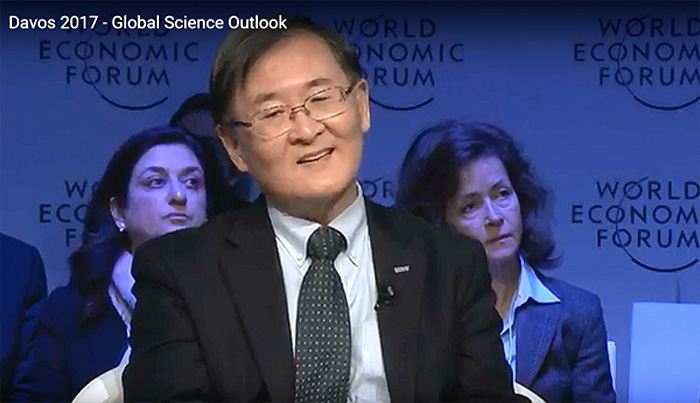people

President Sung-Mo Kang of KAIST participated in the World Economic Forum’s Annual Meeting January 17-20, 2017 in Davos, Switzerland.
On January 20, President Kang joined the Arena discussion on the outlook of global science in the year ahead with a group of distinguished scientists, including the Director of the US National Science Foundation, France A. Córdova, and the Editor-in-Chief of Nature, Philip Campbell.
Under Dr. Campbell’s moderation of the session, the panelists introduced their perspectives on 2017 and engaged in free discussions among themselves and with the audience.
President Kang began his talks on four major technological trends that have caught much of our attention in recent years, which he called “ICBM.” The “I” stands for the Internet of Things (IoT), “C” for cloud computing, “B” for brain, in other words, cognitive computer science such as artificial intelligence, and “M” for mobile technology that has been widely applied to unmanned ground vehicles and drones.
He noted the emergence of brain research as one of the most exciting fields in the coming years, and accordingly, we will learn more about its functions and develop promising results in treating brain-related diseases, i.e., a nanoscale memory chip being inserted into a patient suffering from dementia for targeted therapy.
President Kang also mentioned the role of higher education in the era of the Fourth Industrial Revolution, for example, how to foster scientists and engineers to responsibly meet with the challenges anticipated in today’s rapidly changing technological environments. He said that robots would replace many jobs, and it is important to come up with real solutions for such changes.
Lastly, President Kang stressed that the scientific community should continue its efforts to communicate with the public, accurately informing them of key scientific issues and offering opportunities to hold public discussions and debates that have greater influence over society. He presented a case of Korea’s latest outbreaks of Avian Influenza that resulted in destroying hundreds of thousands of infected chickens to prevent the spread of the disease, and highlighted the need for maintaining a strong communication channel between science and the public.
The full list of the participating panelists included Sung-Mo Steve Kang, President, KAIST; Marc N. Casper, President and Chief Executive Officer, Thermo Fisher Scientific, USA; France A. Córdova, Director of the National Science Foundation (NSF), USA; and Fabiola Gianotti, Director General of the European Organization for Nuclear Research (CERN), Geneva, Switzerland.
To watch the entire discussion, please go to https://www.youtube.com/watch?v=bF-joYnyYa0.
-
event KAIST School of Computing Unveils 'KRAFTON Building,' A Symbol of Collective Generosity
< (From the fifth from the left) Provost and Executive Vice President Gyun Min Lee, Auditor Eun Woo Lee, President Kwang-Hyung Lee, Dean of the School of Computing Seok-Young Ryu, former Krafton member and donor Woong-Hee Cho, Krafton Chairman Byung-Gyu Chang > KAIST announced on May 20th the completion of the expansion building for its School of Computing, the "KRAFTON Building." The project began in June 2021 with an ₩11 billion donation from KRAFTON and its employees, eventually gr
2025-05-21 -
event <Big Coins> Exhibition: Where Coins and Imagination Collide - Held at SUPEX Hall, KAIST Seoul Campus
KAIST (President Kwang-Hyung Lee) announced on May 19th the opening of the solo exhibition, “Big Coins,” by photographer and media artist Hojun Ji (Adjunct Professor, Department of Industrial Design) at the SUPEX Hall in the Business School of the Seoul Campus. The exhibition will run from May 19th to the end of February of the following year. This exhibition at the KAIST Seoul Campus Business School presents artworks with an insightful perspective, inviting diverse interpretations
2025-05-20 -
research “For the First Time, We Shared a Meaningful Exchange”: KAIST Develops an AI App for Parents and Minimally Verbal Autistic Children Connect
• KAIST team up with NAVER AI Lab and Dodakim Child Development Center Develop ‘AAcessTalk’, an AI-driven Communication Tool bridging the gap Between Children with Autism and their Parents • The project earned the prestigious Best Paper Award at the ACM CHI 2025, the Premier International Conference in Human-Computer Interaction • Families share heartwarming stories of breakthrough communication and newfound understanding. < Photo 1. (From left) Professor Hw
2025-05-19 -
research Decoding Fear: KAIST Identifies An Affective Brain Circuit Crucial for Fear Memory Formation by Non-nociceptive Threat Stimulus
Fear memories can form in the brain following exposure to threatening situations such as natural disasters, accidents, or violence. When these memories become excessive or distorted, they can lead to severe mental health disorders, including post-traumatic stress disorder (PTSD), anxiety disorders, and depression. However, the mechanisms underlying fear memory formation triggered by affective pain rather than direct physical pain have remained largely unexplored – until now. A KAIST resea
2025-05-15 -
research KAIST Discovers Protein Switch that Turns Anti-Viral Immune Response On and Off
Even after the COVID-19 pandemic, various new infectious diseases continue to emerge, posing ongoing viral threats that demand robust and sustained immune defenses. However, excessive immune reactions can also harm body tissues, causing significant health issues. KAIST and an international research team have discovered a critical protein that acts as a 'switch' regulating immune responses to viruses. This breakthrough is expected to lay the groundwork for future infectious disease responses and
2025-05-14